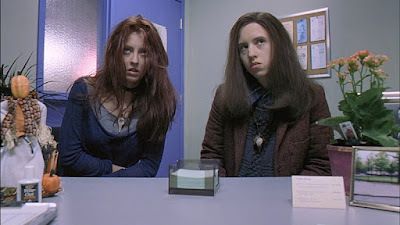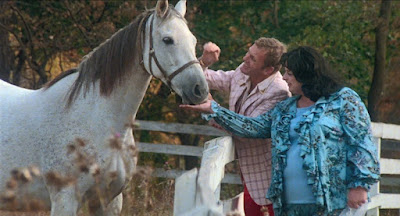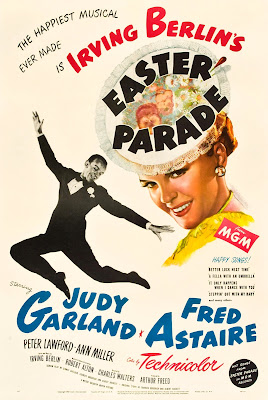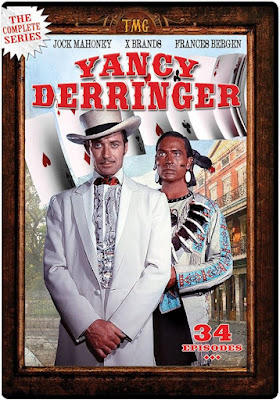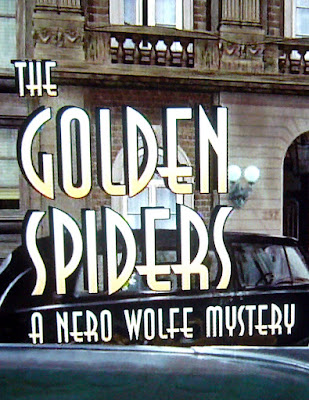(1972) Written and directed by John Waters; Starring: Divine,
David Lochary, Mary Vivian Pearce, Mink Stole, Danny Mills, Edith Massey, Cookie
Mueller and Paul Swift; Available on Blu-ray and DVD
Rating: ***
This post is part of the Mismatched Couples Blogathon,
hosted by Gill Jacob from Realweegiemidget Reviews and Yours Truly, covering some of cinema’s greatest odd couples. Be sure to
check out all the fun posts over this three-day blogging event!
“The only thing that ever happens to me in this movie that
shocks me is when the audience groans disgustedly when the Egg Man kisses Edie
(Edith Massey), and I think that’s so mean, and they do do it, and they’ve
always done it, and it really saddens me, because I didn’t mean that to be a
shock shot. That was a tender moment in the film.” – John Waters (from 1997 Criterion commentary)

The term “critic proof” gets thrown around haphazardly to
describe anything that captures the imagination (and dollars) of the public
despite the lack of perceived artistic merit. While I’m not a big fan of the
term, it occasionally serves its purpose. The mere mention of the title Pink
Flamingos conjures a host of unsavory mental images, even for those who’ve
never seen it. Denouncing it as trash is reductive, although praising it as a wickedly
subversive satire about suburban malaise might be pushing things a little too
far. John Waters wanted to raise eyebrows with his film, not preach to the
audience.* He achieved his objective with “an antisocial group effort”
comprised of family, friends, and general malcontents, known collectively as
the “Dreamlanders.” They shared a common disdain for the hollow peace and love
ethos of hippie culture, using the Manson family as a template.** Waters
economically utilized the house he was renting with his friend (and the film’s
co-star), Mink Stole, for the Marble residence. For Divine’s family,* Waters and
his crew purchased a dilapidated old trailer for $100, added a wall, furnished
it with tacky decorations from thrift stores, and painted it pink and gray,
only so it could be burned down in a later scene. His landlord’s 1958 Cadillac***
became Divine’s mode of transportation in the movie. Waters shot the film
guerilla-style, without permits, on 16 mm reversal stock (his first color
feature). With a self-imposed “X” rating at the time (it would easily land an
“NC-17” now), Pink Flamingos quickly earned its gross-out reputation, amusing
and horrifying filmgoers everywhere. Yet, amidst this symphony of scatological humor,
is a (dare I say) sweet subplot? You’ll learn more about this, dear reader, in
a moment…
* Fun Fact #1: Per Waters, “I hate message movies and pride
myself on the fact that my work has no socially redeeming value.”
** Fun Fact #2: The opening credits include, “For Sadie,
Katie and Les,” a reference to a few of the so-called “Manson Girls.” Another
direct Manson family reference is a framed picture of Susan Atkins in the
Marbles’ living room whom Waters would later befriend through correspondence.
** Fun Fact #3: The jogger that Divine gleefully tries to
hit and run is Waters’ brother Steve.
Waters himself narrates the movie, using the most
self-consciously obnoxious Baltimore accent he can muster* to set the stage. Divine
(Divine, aka Harris Glen Milstead), living under the alias “Babs Johnson” has settled
in a dumpy mobile home in Phoenix, Maryland with her family: her mentally
unbalanced but affable mother, Edie, “The Egg Lady” (Edith Massey), who sits in
a playpen all day, consuming huge quantities of eggs, demented son Crackers (Danny
Mills), and voyeuristic daughter Cotton (Mary Vivian Pearce). Divine holds the undisputed
crown as the “Filthiest Person Alive” until Connie and Raymond Marble (Mink
Stole and David Lochary)** vow to take that distinction away. The Marbles run a
black-market baby ring, keeping women chained up in their basement, where
they’re impregnated by the Marbles’ butler Channing (Channing Wilroy), ultimately
selling their newborns to lesbian couples.
* Fun Fact #4: Waters originally approached his idol at the
time, local celebrity Mr. Ray, who owned a wig store, to narrate his movie.
When Ray flatly refused, Waters took matters into his own hands, as “Mr. Jay.”
** Fun Fact #5: The vibrant blue, red and yellow hair colors
sported by Lochary, Stole, and Divine couldn’t be found on a drugstore shelf, so
they had to improvise with ink, Magic Marker and food coloring.

Pink Flamingos is a cavalcade of ickiness guaranteed
to test your intestinal fortitude, and just when you think it couldn’t possibly
get any worse, Mr. Waters has something else up his sleeve (but don’t worry,
it’s all in bad taste). Get ready for a sex scene involving a live chicken,* artificial
insemination (thankfully simulated), and Divine’s birthday party scene (which
may have the film’s second-most-talked-about sequence). When the police are
called out to investigate Divine’s home, they’re ambushed by her crazed
followers and eaten.** Steel yourself for the movie’s pièce de resistance, when
Divine asserts her dominance as the filthiest person alive by eating a poodle’s
poop (for real). After your retinas have absorbed all they can stand, be
prepared to never again be able to hear the songs “Surfing Bird” or “How Much
is that Doggie in the Window?” without associating images from this movie. It’s
the gift that keeps on giving.
* Fun Fact #6: While the chicken’s onscreen demise is understandably
hard to watch, Waters pointed out that the cast cooked and ate it later that
day.
** Fun Fact #7: Waters acknowledged this scene was heavily
influenced by Night of the Living Dead.
Divine chews the scenery (and I do mean, “chews the
scenery”) with gusto, owning every scene that she’s in. She’s an unstoppable
force of nature reinforced with her signature look, thanks to makeup man Van
Smith, who shaved the front part of Divine’s head to accommodate the
exaggerated eye makeup. Waters is quick to point out that Divine wasn’t going
for glamorous, but quite the opposite (“I wanted him to be the Godzilla of drag
queens.”). Divine’s wrath is unleashed after the Marbles unwisely send her a
giftwrapped bowel movement,* and you just know they don’t stand a chance.
* Fun Fact #8: The real human turd belonged to none other
than Divine, who donated it for the cause and boxed it up. The scene where the
Marbles mail the package was shot in Waters’ neighborhood post office, with a
real-life mailman (who was blissfully unaware of the package contents).
But amidst the ample distribution of manure, a lovely flower
blooms, a romance between Edie the Egg Lady and the Egg Man (Paul Swift). Sure,
it’s mostly based on supply and demand – Edie has an insatiable desire for eggs
and he’s got the goods (“Oh, I do love you Mr. Egg Man. Even though I do love
my little eggies just a little bit better, I do love you more than any man I
have ever known.”). There’s something oddly innocent and pure about their love.
Sure, they probably have at least a 20-year age difference, and she prefers the
sedentary lifestyle, while he’s always roaming the neighborhood peddling his
wares, but they somehow make it work, based on a mutual affinity for hen fruit.

Appropriately enough, the Criterion Blu-ray for Pink
Flamingos is equipped with a barf bag, which might tell the uninitiated all
they need to know. John Waters asserted, “Pink Flamingos is about the
most American subject there is, competitiveness.” He’s quick to point out,
however, that Divine and her family are happy (in their own twisted way), while
their enemies, the Marbles, are bitter and resentful. 50-plus years later, it’s
still hard to watch in places, but if you can get past the truly tasteless gags,
you might have fun in spite of yourself. Anyone who’s only familiar with John
Waters’ work through Hairspray or Cry-Baby will be in for a
surprise. Waters pointed out that audiences laugh at the outrageously
disgusting things that are occurring onscreen – they’re not simply disgusted. You’ll
either laugh hysterically or clutch your pearls. You know who you are. If you
belong to the former category, enjoy. If not, steer clear.
Sources for this article: Criterion Blu-ray commentary by
John Waters (1997); Shock Value, by John Waters (1981); Trash Trio, by
John Waters (1988); Divine Trash (1998 documentary)


